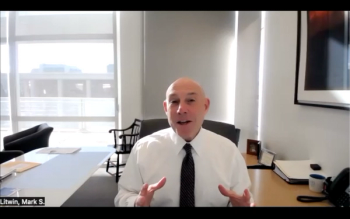
Women in urology: Dr. Loeb explains why she chose the specialty
"I think the future is very bright for women in urology," says Stacy Loeb, MD, MSc.
“Women in Urology” is a new Urology Times section in which women in the field share their path to the specialty and give advice for women considering a career in urology. Stacy Loeb, MD, MSc, assistant professor of urology and population health, New York University Langone and the Manhattan VA, New York, serves as section editor for “Women in Urology” and also served as the interviewee for this installment.
Please describe your practice type and areas of clinical/research interest.
I work at New York University, which is an academic medical center, as well as the Manhattan VA, with the veteran population. My practice is approximately 50% clinical and 50% research.
My main area of clinical and research interest is prostate cancer. I’m also very interested in the use of digital technology in health care.
What prompted you to pursue urology as a specialty?
My grandfather had prostate cancer and passed away when I was in medical school, so that is what led me to be interested in prostate cancer.
Very shortly after his death, I attended a lecture at my medical school on prostate cancer where they offered interested students an opportunity to participate in a research project. That was what started everything. Prior to that, I had not heard of urology and didn’t have any specific plans to go into the field, but after this personal experience with my grandfather’s prostate cancer, that became my passion, and I dedicated most of my life since then to working on prostate cancer clinically and on the research side.
Although women are becoming increasingly prevalent in urology, they are still greatly outnumbered by men. What challenges do you face as a woman working in a specialty that is mostly male?
For one thing, because there have been so few female urologists, there are many female patients out there who are seeking a female urologist. When I first started my practice, even when I had clinic in the prostate center, there would be female patients coming to see me there for issues such as incontinence or infection. So I think that to some extent, as a result of the unbalanced gender distribution in the field, it can affect the types of patients that you see or that make an appointment with you.
That may change as there are a greater number of women in the field, thereby increasing the number of female urology providers who also specialize in female pelvic medicine.
Next:
I think it’s a great field. There are more and more women choosing to go into urology. There is definitely a huge demand for more female urologists. I didn’t have a lot of female mentorship along the way; however, I have really fantastic male mentors in urology and have always been treated very well by my male urology colleagues.
I think that urology offers a lot of options. That is to say, you can be more heavily focused on the clinical side, which offers a very wide range of topics and a very wide range of surgical techniques; or you can be more focused on the administrative side, the education side, or the research side. There is a lot of flexibility in the field in terms of crafting a career that suits your interests, in terms of the sub-specialty as well as the distribution of your practice.
Is there anything else you would like to add?
A couple of years ago, there was a big movement on Twitter with all these hashtags, like #ILookLikeAnEngineer and #ILookLikeASurgeon, so we started the hashtag #ILookLikeAUrologist, which has had thousands of contributions throughout the world, showing the really strong presence of women in the field-and also contributions from a lot of men showing their support for women in urology. I think the future is very bright for women in urology.
Newsletter
Stay current with the latest urology news and practice-changing insights — sign up now for the essential updates every urologist needs.






